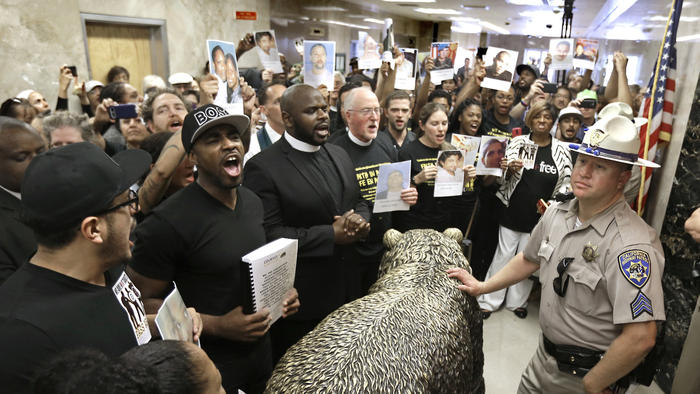California’s New Racial Profiling Law Seen as First Step Toward Police Accountability
Oct 10, 2015
Posted in Mass incarceration, Police-Public Safety

California Highway Patrol officer stands outside the office of Gov. Jerry Brown as protestors shouting “Black lives matter!” block the hallway last month demanding approval of AB 953, a bill aimed at reducing racial profiling by the police. Photo courtesy of AP.
By Ashley Chambers
A state bill that was signed into law this past weekend will usher in new police accountability reforms requiring California law enforcement to collect and report identity data on police stops in order to address racial profiling.
In the face of continuous pressure from community groups and civil rights activists who occupied the State Capitol rallying in support of the bill, Governor Jerry Brown signed Assembly Bill 953 (The Racial and Identity Profiling Act of 2015) into law on Oct. 3.
The bill, authored by Assemblymember Shirley Weber with co-authors Assemblymember Rob Bonta and Senator Holly Mitchell, is designed to combat racial profiling, police misconduct, and help restore trust between police and the community.
Reports show that Black and Latino drivers are pulled over in traffic stops at higher rates than whites, according to the U.S. Department of Justice. Black drivers are 31 percent more likely to be pulled over by police than whites, and Latino drivers are six percent more likely than whites, the Washington Post reported.
In Oakland, 55 percent of vehicle stops involved African Americans while they make up only 28 percent of the city population. Whites were stopped in 12 percent of traffic stops by Oakland police but represent 34 percent of the city population.
This new law, although just a first step, hopes to change that trajectory, according to activists.


Under the law’s requirements, police and other law enforcement agencies track data from traffic and pedestrian stops, including the race, age and gender of the people stopped, the reason for the stop and result, as well as actions taken by the officer.
Each agency will be accountable to the state Attorney General and will submit an annual report to be reviewed by a 19-member advisory board.
“This precedent setting legislation is historic – it is both a moral and legal victory for our state and our nation,” said Rev. Ben McBride, Director of Regional Clergy Development with PICO California, who was part of the coalition of activists that rallied at the State Capitol for Governor Brown to sign the bill.
“The people have spoken and no longer will we be held hostage by rogue officers and departments who see us as criminals unworthy of human dignity simply by virtue of the color of our skin.”
The Racial and Identity Profiling Act (RIPA) will be one of the first laws to revise the definition of “racial and identity profiling,” based on recommendations of the President’s Task Force on 21st Century Policing and the U.S. Department of Justice. It will prohibit profiling based on race, ethnicity, national origin, age, religion, gender identity, sexual orientation, or mental or physical disability.
“It’s a very important first step in creating some transparency and accountability with the way in which law enforcement policies our communities,” said Rosa Aqeel, legislative director with PICO California, one of the co-sponsors of the bill.
“For so many years, folks who live in communities of color have been making complaints on a lot of actions that have led to harassment. Police have dismissed those for years as just being anecdotal,” Aqeel said. “Now, we’re able to see how pervasive racial profiling is across the state.”
Collecting and reporting racial and identity data is just one part of the new law. A RIPA Board will analyze the data and then create solutions to address police violence and unjust policing practices.
Occupying seats on the board will be 19 members representing law enforcement, community organizations, faith leaders, human and civil rights activists, and a university professor specializing in racial and identity equity. One young person, aged 16 to 24, will have a seat on the board as well.
Together, the board will develop guidelines and training for all officers in California, the bill reads, to raise awareness and respect among law enforcement of racial and cultural diversity.
“AB 953 puts California on a path moving from an anecdotal system to one that is data-driven,” said Chauncee Smith, Racial Justice Advocate with the ACLU of California Center for Advocacy & Policy, another co-sponsor of the bill along with the Youth Justice Coalition, Dignity and Power Now, and others.
The board will work in partnership with law enforcement agencies and submit policy recommendations to curb racial profiling.
“The advisory board is a means to the ultimate end,” said Smith. “It is invaluable to ensure law enforcement buy-in on every finding and recommendation from the board.”
It is also important for community members to be actively involved in this process and let their local police departments know that they want to see effective change, Aqeel said.
“Ultimately, it will be up to different communities to take the recommendations from RIPA and see which ones make the most sense for local communities,” she said.
“I think that (AB 953) is a really important first step in the long journey that we have to ensure police accountability,” said Taina Vargas-Edmond, State Advocate with the Ella Baker Center. “We can’t push for policy reforms that will keep our people safer unless we have the data to support and back up what people of color know to be the real experience of our lives.”
“This lets the people know that all of the power is in the hands of the people, in organizing, and in making our voices heard,” Vargas-Edmond said.